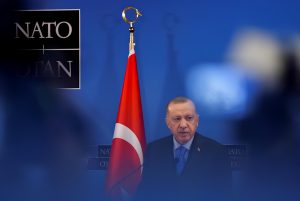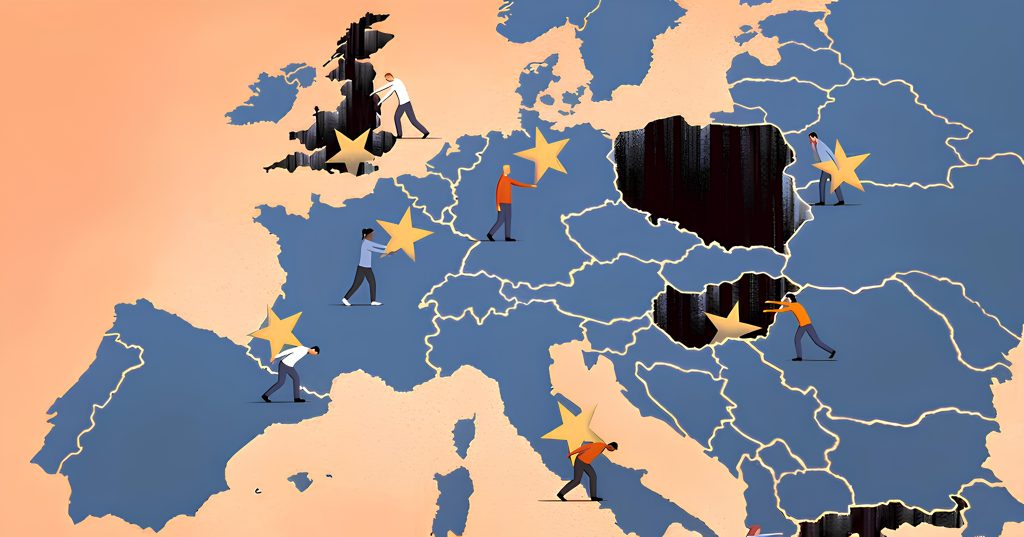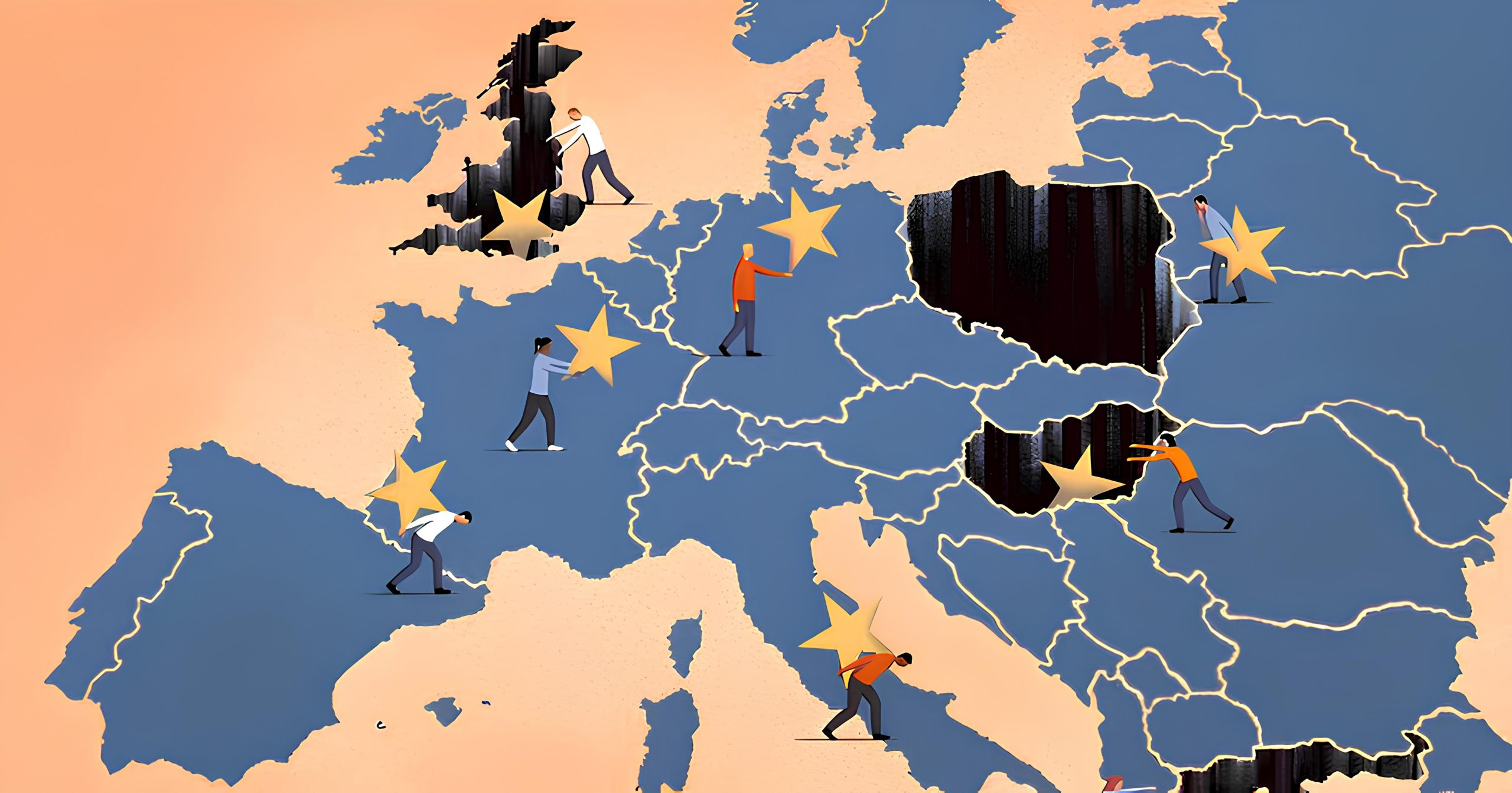








Europe’s transformative decade: economic crises, migration dynamics, and the surge of far-right movements. Spotlight on Türkiye’s refugee stance, EU deals, and the shaping of 2024 political landscape.


Welcome to the Europe Brief, where we take a look at a transformative decade marked by economic turmoil, immigration issues and the rise of far-right movements. We explore Türkiye’s key role, EU agreements and the evolving political environment shaping 2024.
The years between 2008 and 2011 have become a turning point for whole world and particularly for the Middle Eastern and European countries. The economic crisis started in 2008 in USA has quickly spread to European countries and with European Debt Crisis in 2009 especially the smaller and medium sized economies of Europe was in trouble. Furthermore, the Arab Spring started in Tunisia in 2010 quickly spread to other Middle East and North Africa (MENA) countries and one year later in 2011 Syrian Civil War broke out and made already unstable region more unstable and dangerous for people to maintain their livelihoods. Consequently, between 2011 and 2015 there has been an exodus of people coming from the civil war and conflict touched regions of Syria and Iraq to neighbourhood countries such as Türkiye, Jordan, Lebanon, and Egypt. Türkiye hosts the most refugees in the world making it a leading country in the registered refugees.
According to United Nations (UN) records, Türkiye hosts 3.6 million Syrian refugees and approximately 400 thousand people from other nationalities. Turkey’s open-door policy towards refugees is the culmination of Türkiye’s efforts to turn this situation into a geopolitical opportunity and assert its influence in the MENA region in order to be a regional influential player, however in the end neither of these goals were completely attained by Türkiye.
Moreover, the situation does not seem good and manageable in Türkiye and in Europe due to discontent of local people towards the rapidly increasing numbers of refugees and immigrants and local people’s frustration and anger are being canalized by far-right politicians to refugees instead of their government who is the main responsible of not being able to integrate them into the community. Consequently all these are feeding and exacerbating the rise of far right movements in Europe.
Far rights movements in Europe increased exponentially especially after the economic crisis of 2009 and migration crisis of 2015. In countries like Hungary and Poland far right governments are holding on to power. In Hungary right-wing populist and conservatist party Fidesz is in power since 2010 and in Poland Law and Justice Party (PiS) was in power since 2015 up until the elections in 2023. In other European countries after the migration crisis out of fear many people voted for nationalist, conservatist and right-wing parties and now in Italy a conservatist and a far-right party Fratelli d’Italia formed the government after the elections in 2022.
In France, in the second round of presidential elections against Emmanuel Macron’s Renaissance Party’s success of achieving 18 million votes, Marine le Pen from far right conservatist National Rally Party obtained 13 million votes. Moreover, in other European countries touched heavily by the uncontrolled immigration and because of the failed integration policies of immigrants and those with societal problems such as Sweden, Finland, Switzerland, and the Netherlands experienced a rapid rise of far-right in politics, recently in the Netherlands far right leader Geert Wilders obtained an unforeseen victory by obtaining 35 seats in the Dutch Parliament making his party the largest party in the Parliament.
Although the causes of rapid rise of far right are highly debated, the fear policy being pumped into the mainstream media such as the exponential increase of the arrival of immigrants and refugees to Europe and the threat of the disappearance of European cultures, national identities and religion are a big part of this fear policy and the root cause of the rise of far-right policies, parties, and politicians. National governments are also executing measures and deciding national policies to prevent immigration to Europe with main countries executing these national policies becoming Hungary, and Poland.
Furthermore, they tend to disagree with European Union (EU) almost on all the decisions on migration like all the other far right ideologies in European countries since they also criticize the EU at every opportunity and contemplate of exiting EU if they ever acquire the power as incumbent. Against the rising numbers of irregular immigrants coming to EU by illegal means after the migration crisis in 2015, EU politicians and leaders chose to agree with Türkiye in the management of migration in exchange for some concessions to be given to Türkiye if the latter could be able to fulfill all the requirements. Türkiye with the hope of economics benefits, aids and visa liberalization promise, became the EU’s border guard for Southern borders as part of EU’s externalisation of migration policy.
EU’s externalisation of migration policy was formalized with Türkiye after the Migration Deal was concluded on 18 March 2016. This deal has become the first example of EU’s externalisation of migration policy after the Arab Spring Protests in 2011. Furthermore, this deal was frequently criticized by humanitarian organisations and non-governmental organisations by indicating that EU’s policy of externalisation of migration is against human rights and human dignity since many third countries nationals are not being allowed to go to Europe and detained in border countries such as Türkiye, Egypt, Tunisia.
Although these concerns are expressed by humanitarian agencies, EU once again chose to follow the exact same policy path with Tunisia and signed a Memorandum of Understanding (MoU) with Tunisia on 16 July 2023 which rendered Tunisia as responsible for the EU’s borders as part of EU’s externalisation of migration policy. EU agreed to provide Tunisia with financial support to reduce its soaring inflation rate and promised to facilitate the entry of skilled Tunisians into the EU in exchange for Tunisia’s commitment to fight against smuggling and trafficking of migrants and urged Tunisia to carry out research and rescue operations within its maritime borders.
Considering the MoU it’s not completely different from the agreement signed between EU and Türkiye, therefore one could argue that what was agreed with Tunisia seems all new, but this merely reiterates past mistakes and commitments. Therefore, MoU can be considered as a turning point in EU’s migration policies which proves that the EU did not learn from its past mistakes and repeats the same mistake in order to act swiftly in migration policies to prevent the rise of far-right policies.
However, what the EU could not foresee is that the externalisation of migration policies, i.e. making third countries responsible for EU’s borders, does not provide any constructive solutions and migration flow continues and consequently exacerbating the far-right movements in Europe which is the opposite policy impact which the EU aimed at the first place. EU’s carrot and stick approach (rewarding and punishing third countries according to the path of actions that they have taken) is not constructive and presents EU as superior to third countries and destroys the effectiveness and gravity of the values that EU want to spread to third countries.
EU is still unable to present durable solutions in the migration field because of the divergences of opinions between EU member countries. For instance, Poland and Hungary are completely against EU’s migration policy and they hinder EU’s efforts at every opportunity. In late December 2023, there have been two developments in migration field, the first one is the New Pact on Migration and Asylum which was argued and discussed since 2020 has been finally adopted by the European Parliament and the Council of the EU. The New Pact aimed to establish a common approach to migration and asylum which will be based on the principles of solidarity, responsibility, and respect for human rights.
According to this pact, identification methods of non-EU people arriving in EU will be strengthened and consequently increasing the security within the Schengen area; a common management procedure has also been strengthened; and in regard to asylum procedures EU committed to make asylum, return and border procedures quicker and more effective by establishing a new solidarity mechanism amongst member states.
EU’s new approach to migration seems to present changes but as long as EU fails to fulfill its commitments and repeats past mistakes, due to the uncontrolled immigration, the rise of far-right policies and parties might not be controlled. Finally, the other development in late December was the French decision of immigration bill/law this law has been adopted in the French National Assembly and has also been subjected to many criticisms because this immigration law is considered as one of the most racist texts ever adopted in France since the World War II. French President Emmanuel Macron because of the mounting pression towards himself and his party, chose to open a way for far-right policies and politicians in the mainstream politics, indeed a victory for Marine le Pen and for her party.
Ascension of far-right policies in France has become a dangerous element for foreign people or foreign-born French people since this immigration law has brought many changes regarding these aspects. According to the Immigration Law adopted in the French national Assembly, now unemployed immigrants have to wait for at least five years to access some benefits, and the law has created migration law which will determine the numbers of foreigners admitted to the country (not asylum seekers, but foreigners). In family reunification matters previously applicants needed to reside in France for 18 months, now this duration has been increased to 24 months and applicants need to present that they have stable, regular, and sufficient resources and health insurance and their spouses must be at least 21-year-old. Furthermore, the radical change has been in the jus soli principle (rule of law that a child’s citizenship is determined by his or her place of birth).
With the immigration law, people born in France to foreign parents will no longer be able to automatically acquire French nationality, but rather they must wait and must apply for the nationality between the ages of 16-18. All these criteria have provoked the foreign or foreign-born people in France. As France will have elections in 2024 (European Elections), President Macron seems to be trying to haul the support of the parties of the Republicans and of the National Rally. It seems that in many countries far right policies and politicians are gaining power across Europe by implementing fear policies and manipulating people however, in some countries such as in France centrist political parties are helping the far-right movements and parties to grow and thrive. As the far-right policies and politicians thrive after the migration crisis of 2015, on the way to the European Elections in May 2024, Europe is facing an impasse from these movements and their Eurosceptic political views.
In conclusion, 2019 European Elections was a tremendous success and a milestone for far-right politicians and their parties as they gained 27 extra seats in the European Parliament after the elections. This year in the European Elections migration issue seems to be one of the overarching elements for far right politicians and their parties to exploit in the face of exponentially increasing life costs, energy prices, housing shortage and high health costs.
Written By: GABRIEL RAMIREZ
Written By: DILARA SAHIN
Written By: DILRUBA YILMAZ
Written By: NILAY CELIK
Written By: ELDANIZ GUSSEINOV
Written By: JOSEF SCHOEFL
Written By: SELCAN BEDIRHANOGLU
Written By: FATIH CEYLAN
FA’s flagship evening newsletter guilding you through the most important world streis ofthe day. Delivered weekdays.
